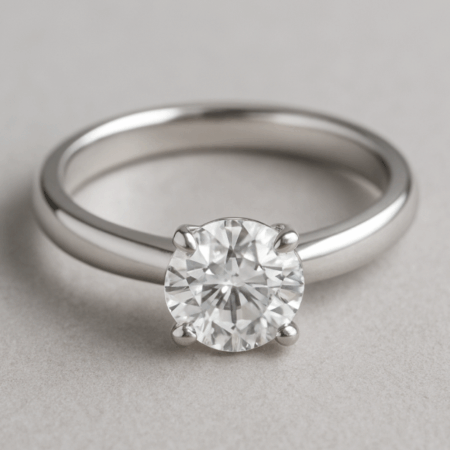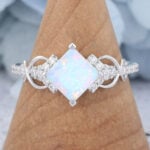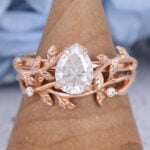Does Platinum Tarnish or Fade? Expert Insights
Platinum is celebrated for its brilliant white luster and exceptional platinum durability, making it a top choice for platinum jewelry like platinum wedding bands and platinum necklaces. A common question arises: does platinum tarnish? Unlike other metals, platinum is renowned for resisting corrosion and fading. In this article, we’ll explore whether tarnished platinum is a concern, compare platinum to other metals, and share expert tips on how to care for a platinum ring. Let’s dive into the facts about platinum’s enduring appeal.
What is Platinum?
Platinum is a rare, precious metal with the chemical symbol Pt and atomic number 78. Its high density and exceptional corrosion resistance make it a top choice for platinum jewelry, such as platinum rings for men and platinum necklaces. These properties ensure platinum’s durability and timeless appeal in high-quality jewelry pieces.

What is Platinum Used For?
Beyond its role in crafting stunning platinum necklaces and rings, platinum is critical in various industries. It’s widely used in catalytic converters for vehicles, medical devices like pacemakers, and electronics due to its stability and conductivity. This versatility underscores platinum’s importance in both aesthetic and functional applications.
The Rarity and Value of Platinum
Found in only a few global deposits, primarily in South Africa and Russia, platinum’s scarcity drives its high value of platinum. How much is platinum worth? Market prices typically range from $800 to $1,200 per ounce, often surpassing gold depending on trends. This rarity prompts the question: is platinum a good investment? Its strong demand and durability make it a compelling choice for investors and jewelry enthusiasts alike.
Does Platinum Tarnish?
The question does platinum tarnish is key for jewelry buyers. Tarnishing occurs when metals react with oxygen or sulfur, causing discoloration. Does platinum tarnish like silver? Unlike silver, which darkens easily, platinum’s chemical stability prevents tarnishing. Tarnished platinum is not a common issue, as metallurgists confirm its resistance to corrosion. Does platinum oxidize? Only under extreme conditions, like exposure to strong acids, does platinum react. Can platinum rust? No, rust is specific to iron, and platinum’s inert nature ensures it remains unaffected. This durability sets platinum apart.
Does Platinum Fade?
Does platinum’s iconic sheen fade? Does platinum tarnish or lose its luster? Unlike white gold, which relies on rhodium plating that wears off, platinum’s natural white color remains consistent. However, does platinum scratch? Yes, platinum is softer than some metals, leading to surface scratches that may dull its appearance. These scratches don’t affect the value of platinum or its integrity. Professional polishing can restore the shine of platinum jewelry, such as platinum wedding bands, keeping them radiant.
Why Platinum’s Appearance May Change
While tarnished platinum isn’t a concern, platinum’s appearance can change due to external factors. Surface scratches, common in platinum rings for men or platinum necklaces, create a matte “patina” that some find attractive. Dirt, oils, or cosmetics can also dull the surface. Rarely, exposure to chlorine (e.g., in pools) may cause minor cosmetic changes, but these aren’t signs of oxidation. Unlike silver, platinum’s issues are superficial and fixable, reinforcing that does platinum tarnish is answered with a clear no.
How to Care for Platinum Jewelry
Maintaining platinum jewelry is simple with proper care. Here’s how to care for a platinum ring or other pieces:
Clean regularly: Use warm water, mild soap, and a soft brush to remove dirt. Avoid harsh chemicals.
Store safely: Keep your platinum wedding band or platinum necklace in a soft pouch to prevent scratches.
Polish professionally: Jewelers can buff out scratches to restore shine.
Protect from wear: Remove jewelry during rough activities to minimize scratches.
These steps preserve platinum durability and ensure your pieces stay stunning.
Platinum vs. Other Metals
How does platinum compare to other metals? Here’s a breakdown:
White Gold: Requires rhodium plating, which fades, unlike platinum. Does platinum tarnish like silver? No, it’s far more resistant.
Silver: Tarnishes quickly due to sulfur reactions.
Gold: Durable but softer, with color varying by alloy.
Titanium: Which is lighter, titanium or platinum? Titanium is lighter but less prestigious, lacking platinum’s luster and value of platinum.
Platinum’s qualities make it a premium choice for platinum jewelry.
Why Choose Platinum for Jewelry?
Platinum’s unique combination of beauty and strength makes it a favorite for platinum jewelry, especially for significant pieces like engagement rings and bracelets. Its hypoallergenic properties make it ideal for sensitive skin, unlike some metals that may cause irritation. Additionally, platinum’s weight gives it a substantial, luxurious feel, distinguishing it from lighter alternatives like titanium. Which is lighter, titanium or platinum? While titanium is lighter, platinum’s heft adds to its premium appeal, making it a symbol of enduring commitment and style.
Environmental and Ethical Considerations
Platinum’s rarity raises questions about its sourcing. How rare is platinum? Its limited deposits, primarily in South Africa and Russia, make ethical mining practices crucial. Many jewelers now offer responsibly sourced platinum, ensuring minimal environmental impact and fair labor standards. Choosing certified platinum jewelry supports sustainable practices while maintaining the metal’s high value of platinum. This ethical dimension adds another layer to platinum’s appeal for conscientious buyers.
Platinum as an Investment
Given its rarity, is platinum a good investment? The value of platinum is driven by its scarcity and industrial demand. How much is platinum worth? Market prices typically range from $800 to $1,200 per ounce. Its durability and rarity make it a strong choice for platinum jewelry or as a financial asset.
Conclusion
So, does platinum tarnish or fade? The answer is no. Platinum’s exceptional platinum durability and resistance to corrosion make it a top choice for platinum jewelry like platinum necklaces and platinum wedding bands. While scratches or patina may occur, these are easily managed with proper care. Whether you’re considering platinum rings for men or exploring the value of platinum as an investment, its rarity and resilience are unmatched. Follow simple maintenance tips to keep your platinum pieces radiant, and enjoy their timeless beauty for years to come.
FAQs About Does Platinum Tarnish or Fade
Does Platinum Tarnish Like Silver?
No, platinum doesn’t tarnish like silver. Silver reacts with sulfur to form a dark layer, while platinum’s stability prevents such reactions.
Does Platinum Scratch?
Yes, platinum can develop surface scratches due to its softness, but these can be polished out by a jeweler.
Does Platinum Oxidize?
Platinum rarely oxidizes, only reacting under extreme chemical exposure, unlike less stable metals.
Can Platinum Rust?
No, platinum cannot rust, as rust is specific to iron-based metals.
Is Platinum Magnetic?
Many ask, is platinum magnetic? No, pure platinum is non-magnetic, a trait shared with gold and silver. This property enhances its use in sensitive applications, further showcasing what is platinum used for.
How to Care for a Platinum Ring?
Clean with mild soap and water, store in a soft pouch, and polish periodically to maintain its shine.
Which is Lighter, Titanium or Platinum?
Titanium is lighter than platinum, but platinum offers greater prestige and value.
How Rare is Platinum?
Platinum is extremely rare, found in limited global deposits, contributing to its high value.
 Christmas: 25% off All ltems · Code AFJ25 ·Ends Dec 30 30% off All Items ·On Orders Over $600 – Code AMANDA30
Christmas: 25% off All ltems · Code AFJ25 ·Ends Dec 30 30% off All Items ·On Orders Over $600 – Code AMANDA30


